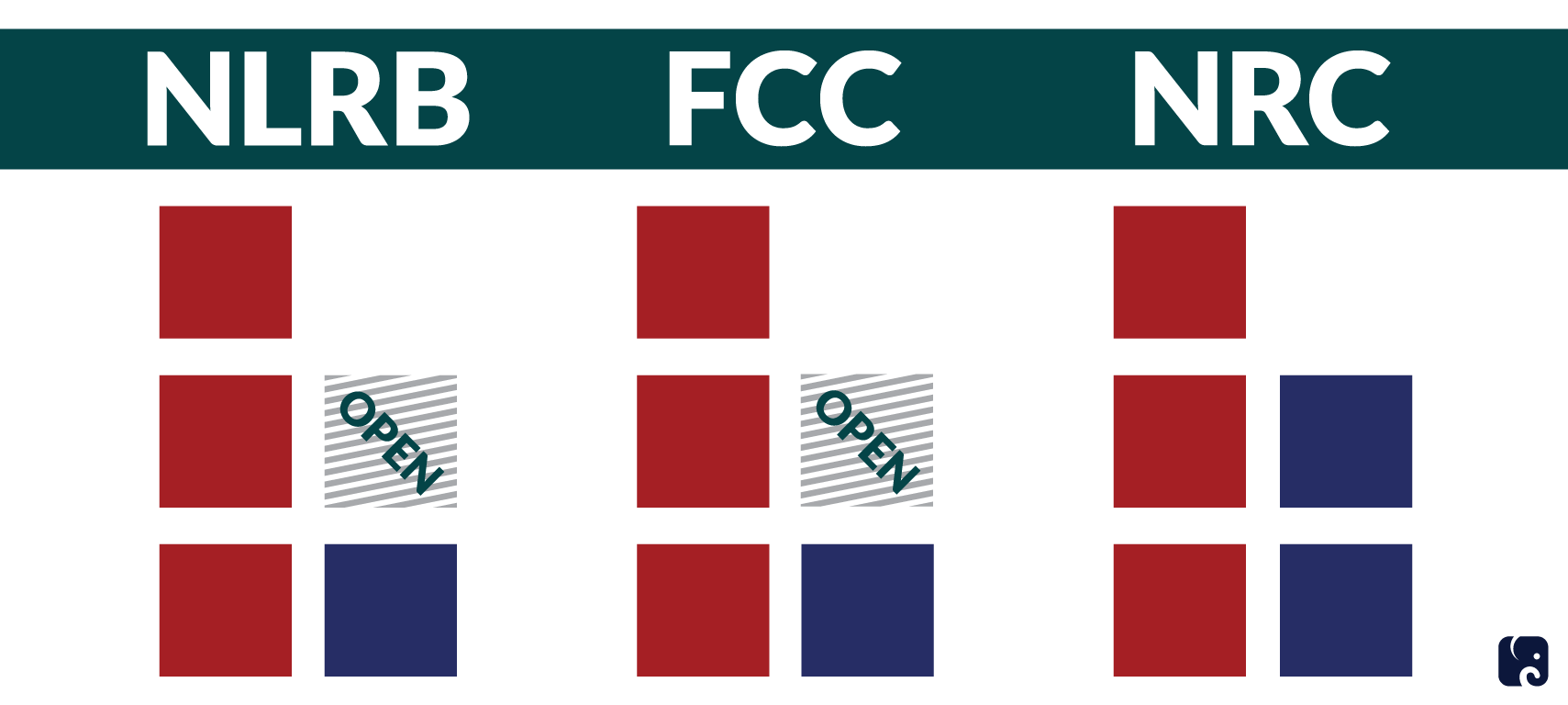Policy Progress on Federal Boards & Commissions
KEY TAKEAWAYS
- The Trump administration has restored Republican control to five major independent federal agencies: the NLRB, FCC, Nuclear Regulatory Commission, the CFTC, and FTC.
- Under Republican leadership, these boards and commissions have worked to protect internet freedom, promote nuclear energy development, and roll back burdensome regulations.
- Republicans are poised to reverse harmful Obama-era policies such as the FCC’s adoption of net neutrality and NLRB’s attempts to thwart state-level right-to-work policies.
Unions, energy regulation, freedom of the internet – these are just a few of the pivotal policy areas where independent federal regulatory boards hold power. Most of the members of these boards are appointed for set terms by the president and confirmed by the Senate. In the current Congress, Senate Republicans have confirmed 54 nominees to important boards and commissions. As a result, at least five major agencies have been restored to Republican control: the National Labor Relations Board, the Federal Communications Commission, the Nuclear Regulatory Commission, the Commodity Futures Trading Commission, and the Federal Trade Commission.
Significant Regulatory Boards Where Republicans Now Hold a Majority

SIGNIFICANT BOARDS Advancing Republican Policy
With control of the White House and Senate following the 2016 elections, Republicans have had an opportunity to align these independent agencies with the priorities of the American people. They have used their new power to undo some of the harms of the previous administration and advance important policies on a number of fronts.
The National Labor Relations Board enforces laws that prohibit unfair labor practices by employers or employees. The board oversees union elections and resolves disputes between employers and labor unions. It has five seats, and members serve staggered five-year terms. One of President Obama’s Democratic appointees on the board will serve until her term expires in December 2019. President Trump appointed the NLRB’s current chairman and two other Republican members. He has recently re-nominated an Obama Democratic appointee whose term expired in August.
The Obama NLRB tried to stymie right-to-work policies at the state level. When Boeing began production in South Carolina, a right-to-work state, the board tried to force the company to continue operations in unionized Washington state.
The Obama-era NLRB also expanded the “joint employer” standard that threatened small franchisees and their workers. The standard would have placed responsibility for employee relations with the parent company, stripping local control away from small business owners. Under Republican leadership, harmful Obama-era rulings may be modified or reversed in the coming years.
The NLRB is now working to improve its efficiency. It recently launched a pilot program to increase the use of its alternative dispute resolution program, which can save participants time and money and give them a greater say over the outcome of their dispute.
The Federal Communications Commission regulates radio, television, satellite, cable, and telephone and other wireline communications. The Communications Act of 1934 fixes the commission at five commissioners and provides that no more than three of them can be members of the same political party. There are currently four commissioners: three Republicans and one Democrat.
The FCC under Chairman Ajit Pai has taken significant steps to reverse overreaching regulatory actions implemented and considered in the Obama era. In 2015, under pressure from President Obama, the Democrat-led commission imposed utility-style regulations on internet service providers under the guise of ensuring “net neutrality.” The order by the FCC went beyond neutrality and allowed the commission to supervise an ISP’s rates and practices and force it to provide service. In the Restoring Internet Freedom Order, which went into effect this past June, the commission returned to the light-touch regulatory framework that had allowed the internet to develop.
The Nuclear Regulatory Commission regulates nuclear reactors and nuclear waste management. It is composed of five commissioners, each of whom serves a five-year term following appointment by the president and confirmation by the Senate. President Trump appointed three of the five current commissioners.
The NRC is currently working on a number of regulatory reform efforts. It is working with industry to modernize licensing procedures for new advanced nuclear reactors. The NRC is trying to ensure that decisions regarding nuclear policy are based on facts, not unreasonable fears and taboos regarding nuclear energy. These approaches mark a departure from the Obama-era NRC, which was criticized for adopting anti-nuclear energy rules.
Other major boards with new Republican majorities include the Federal Trade Commission, which protects consumers from anticompetitive, deceptive, and unfair business practices. The current composition is three Republicans, and two Democrats. In addition, the Federal Energy Regulatory Commission is now evenly divided and awaits appointment of a third Republican nominee.
Next Article Previous Article
